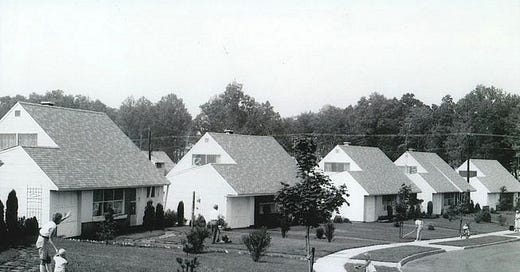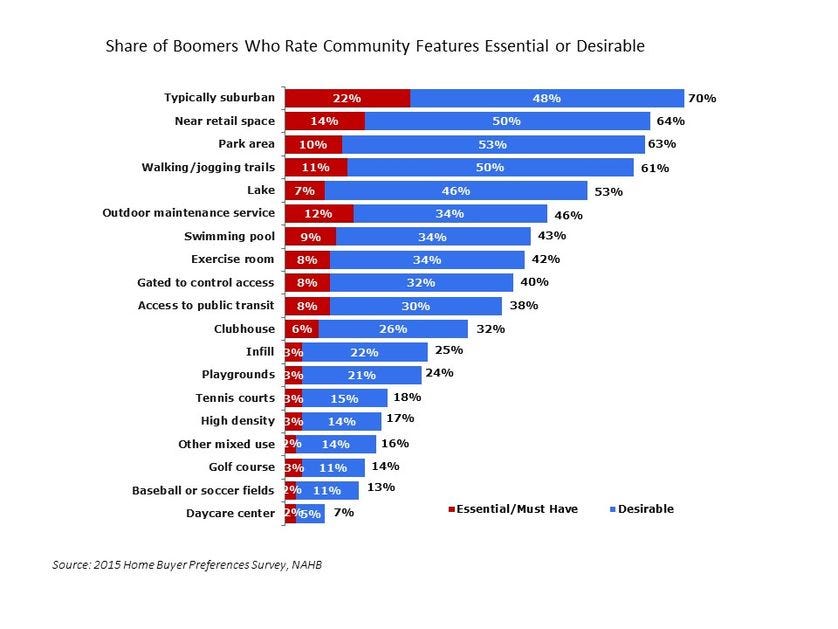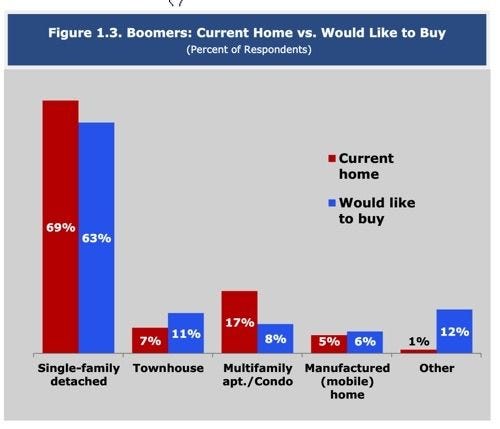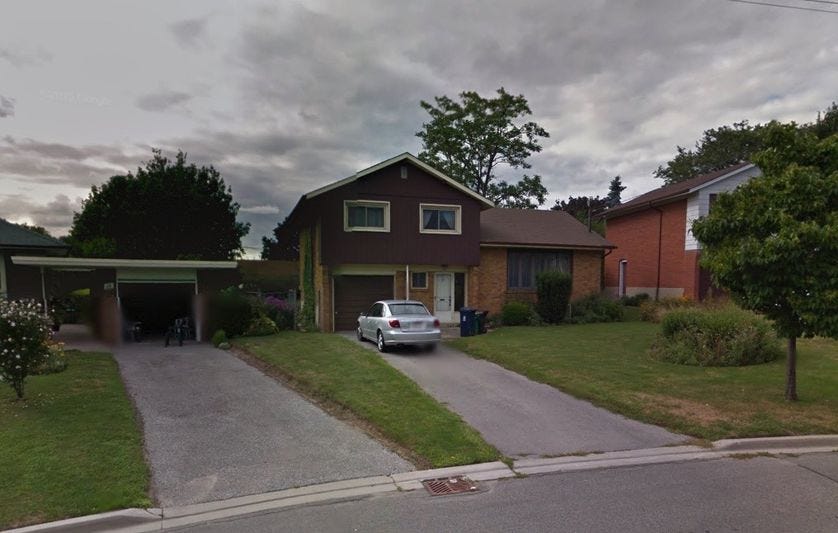From the Archives: Study confirms that boomers are clueless
Before you get mad at me, look at the results of this survey about how they say they want to live out their years.
I am on the road (on the train actually) but will be back to original programming shortly. Meanwhile, over on Streetsblog USA, Kea Wilson asks “Is U.S. Transportation Policy Ready For The ‘Silver Tsunami’?” I recently learned of Betteridge's Law of Headlines, which suggests that “any headline ending in a question mark can be answered with "no.” It is certainly the case here! Kea also republished a post of mine, Survey: Boomers Don’t Accept That They Won’t Be Able To Drive Forever, (Thank you, Kea!) in which I originally referenced a deleted post titled “Study confirms that boomers are clueless.” I have reconstructed it here from my archives; it is from 2016 but I believe it is still relevant; I look around now and don’t believe anything much has changed.
The baby boomer generation is huge, roughly 78 million Americans born between the years of 1946 and 1964. The oldest are just turning 70 and the youngest are just 52 (and usually denying that they are even baby boomers.) It’s a big spread. But one thing they all have in common is that they are getting older, and that their lives are changing.
It’s an issue that we have covered before, quoting Jane Gould’s book "Aging in Suburbia," which I described as “a fascinating and troubling book that covers so many of the issues we will be facing down the cul-de-sac.” She notes that boomers “have not considered, at a personal level, what they will do when their homes are too large, their incomes shrink, and their mobility needs are in flux.”
That’s why a new study looking at the housing preferences of the baby boomer generation from the NAHB, the National Association of Home Builders, is so scary. Because when they were surveyed, it appears that what boomers want are big suburban houses on winding culs-de-sac. It proves that Gould was dead on, that the boomers are simply not considering what's down that long and winding road.
It’s bizarre. 78 percent actively prefer a cul-de-sac to a connected street. They want double car garages. They want 2,000 square feet on one level. They want three bedrooms. And they really, really don’t like the city.
Only 7 percent of boomers prefer a central city location. About two-thirds prefer a home in the suburbs (close or outlying) and just over a quarter prefer a rural area. Only 8 percent thought being near public transit was essential. Because of course, they're going to be driving forever.
Yet the main reason they might consider a move is the worry about “changes in health or increased physical limitations. And “the leading two reasons that would motivate boomers to take on a potential move are finding greater peace of mind and a fuller life.”
Not high on any boomer’s list is the environment. Only 13 percent are willing to pay more out of concern for it. However they will pay more if they'll get lower utility bills, up to $10,000 to save $1,000 per year, which is pretty hard to do.
It gets crazier. The second most important thing they want after a cul-de-sac location is to be near retail space. There's no understanding that the pattern of development that they favor makes it just about impossible to have retail space that is close enough to be walkable. Perhaps they mean a short drive, but what happens when they have to hang up the keys?
Interestingly, the least desired feature for the “get off my lawn” crowd is a daycare center. Sure, they don’t need it, but daycare is also a sign of a mixed, healthy community. They also don’t want to be near high-density housing. In summary, they really want “a typically suburban neighbourhood with single family detached homes close to area and retail space.” Which, according to almost every expert, is just about the worst setup you can come up with for an aging population.
The contradictions abound. Americans want a fuller life, but they don’t want to live where the amenities, the libraries and theaters and bookstores and where the other people are, which is in the city. They are worried about their health but don’t want to be where the hospitals and the doctors and the specialists are. They want peace of mind, but they still want 2,000 square feet of house in the middle of a lawn that has to be mowed, on a cul-de-sac where they can’t get transit. Basically they want what they have now, but on one floor.
Perhaps this should be taken with a grain of salt. Henry Ford purportedly said “If I had asked people what they wanted, they would have said faster horses.” Mick Jagger famously noted that “You can’t always get what you want,” but there's such a disconnect here between what people say they want, and what they ultimately need.
I noted in an earlier post how I watched my mother-in-law age in a house on a suburban cul-de-sac. It was a terrible experience, with her unable to get out without my wife driving out to help her. She had little money, yet she had to pay for people to mow her lawn and shovel her snow and even take out her garbage. If we wanted to hire someone to help we had to pay huge cab fares just to get them there. This is no way to live. Yet if boomers follow their desires as stated in this survey, that is pretty much how it will end up for many of them.
The next few years are going to see a vast transformation as such a huge number of boomers retire. Let’s try and get it right.








You wrote “The contradictions abound. Americans want a fuller life, but they don’t want to live where the amenities, the libraries and theaters and bookstores and where the other people are, which is in the city. “
Actually, typically they don’t consider libraries, theaters, and other city amenities to be the key to a fuller life. The amenities they care about are things like their church, their clubs, their pets, their garden, their own home, and their neighborhood friends. Their books are likely to be ordered online, and films are typically streamed.
There are more people in the suburbs than in urban zip codes.
There are plenty of hospitals, doctors, and specialists nearby in the suburbs and exurbs, and a person too fragile to drive is probably also too fragile to want to walk long distances or to take public transit.
Most retirees who no longer drive can get rides. There are plenty of lawn services, trash services, delivery services, and ride options, from my personal experience with elderly family and neighbors who aged in place. Realize, anyone in their sixties has or had parents who have gone through this exact same thing, so they know what is involved. There are also often paid helpers and sometimes young relatives that are willing to trade basic help for free rent.
There are not services that replace your friends, your church, your pets, your garden, your community, or your own home that you love. People who did not like cities or public transit when they are young are not going to like it any better when they are old.
I am in my sixties, live in a rural exurb, and moving to a city would mean giving up everything that makes my life worth living. Why on earth would you think I would want to do that when I retire? I would literally rather just die and get it over with than move to a city.
What do you expect when boomers have been bombarded since birth with marketing telling them that suburbia is the paradise that will make all their dreams come true and news that suggests that cities are full of hooligan children and criminal immigrants ready to rape and murder them before stealing everything they have. This crap doesn’t appear out of a vacuum. It is manufactured by people with stuff to sell. We should not be surprised that marketing works.